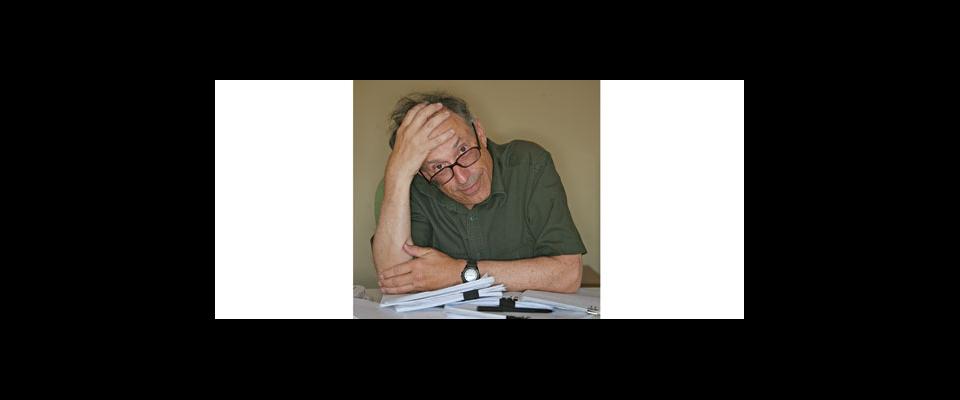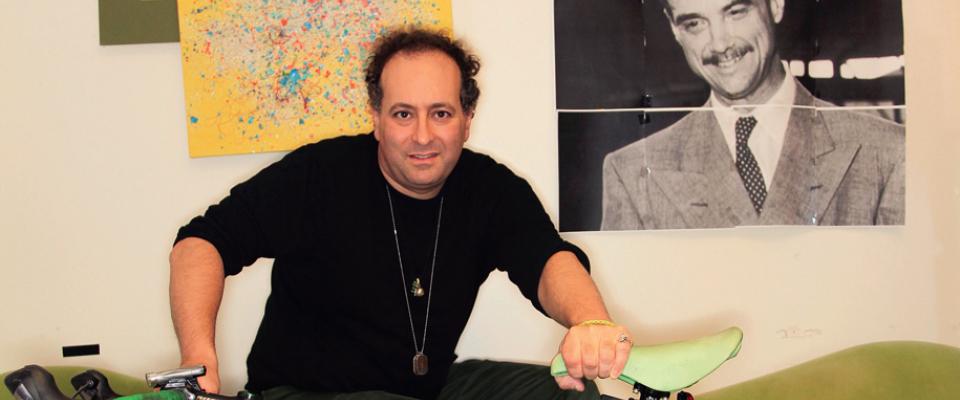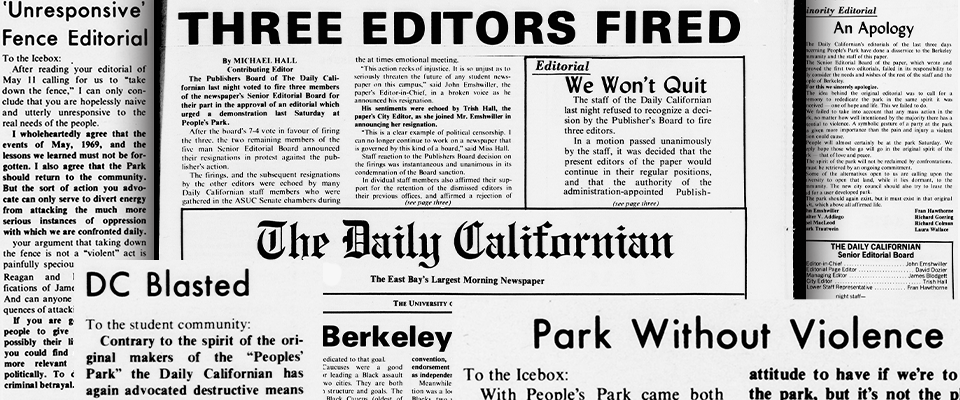How two Berkeley bookstores fought, and still fight, for their values
In the twilight hours of a February morning in 1989, Cody’s Books on Telegraph Avenue was firebombed. Pressure was on for Andy Ross, Cody’s owner, to remove from the shelves Salman Rushdie’s new novel, The Satanic Verses, which satirizes parts of Islamic culture. A few months after its release, Iran’s spiritual leader, Ayatollah Khomeini, issued a fatwa and offered a $2.5 million bounty to anyone who killed Rushdie and his publishers. All over the world, anyone associated with the book was targeted; publishers, translators, and vendors were attacked and in some cases killed.
In Berkeley, Cody’s got lucky, not just because the store and its staff escaped serious damage or injury from the firebomb—a Molotov cocktail of sorts lofted through the front window—but because when employees and the fire department were cleaning up, they found an unexploded pipe bomb in the wreckage. The bomb squad had to come in to pack it with sand bags and detonate it. After watching his store rumble from the blast, a shaken Andy Ross gathered his staff and asked whether Cody’s should continue to carry Rushdie’s book.
“I didn’t know what to do,” Ross told me over a cup of coffee on a recent spring morning in Oakland. “I said, look, if we carry this book our lives are in danger.” In what Ross described as one of his proudest moments as a bookseller, his staff voted unanimously to continue carrying the book, even as all the chain stores and some independents were pulling it. “Of course,” he said, “if things worked out differently and people got killed, I wouldn’t have been so proud of that moment. But we didn’t, so instead of being foolhardy, the world believed we were courageous defenders of free speech.” He smiled wryly and added, “Which we were.”
Ross bought the store in 1977 from Pat and Fred Cody, who had opened it back in ’56. It had become a fixture in Berkeley, not just famous for its books, but among other things for providing a safe haven for people tear-gassed by police during the Free Speech Movement protests of the ’60s. When Ross took over, Berkeley’s counterculture hadn’t yet died off, and Cody’s, along with Moe’s Books down the street, was a gathering place. “We could have never done Cody’s in Salt Lake City,” Ross said. “We couldn’t have even done it in San Francisco. I can only claim a certain amount of credit for it. It was really because of the community, with its incredibly vibrant intellectual life. We were completely in synch with that spirit.”
It was that spirit that made bookstores places of reverence for Berkeleyans. Karen and Bill McClung founded University Press Books in ’74 with the backing of 50 partners—friends, authors, and University faculty. Karen and Bill were both working for UC Press in the late ’60s when they noticed that the books they edited weren’t seeing the light of day outside the University halls.
Over the front door of the McClungs’ shop on Bancroft Way, a sign reads “Ten Thousand Minds on Fire,” a phrase Bill took and tweaked from a biography of Ralph Waldo Emerson. “A book is somebody’s mind on fire,” he explained after promising to find me a collection of Emerson’s letters that he loves. Writing a book, he said, “takes an intensity of effort. It’s one of the most substantial things a man can do, I think.”
Bill said that when they started a lot of people thought selling scholarly books would fail. Thirty-six years later the store is still hanging on. But Bill is quick to point out that not everything worthwhile makes a big profit. The question of money, and of bookselling’s future, looms large. Anticipating my next question, he said, “Let me express the hope that you resist successfully what will undoubtedly be a temptation to describe the decline of bookstores in Berkeley.” But the McClungs did reveal the challenges they face as purveyors of an increasingly outmoded technology.
“Everybody in the print world is in survival mode,” Bill lamented. “One way a publisher can survive is to raise the price of books and lower the discount to the intermediaries.” With 10 percent shipping, that leaves a thin margin to keep business in the black. Karen added that she’s noticed a growing trend of students researching books in the store, taking notes, then going home to purchase them online.
Andy Ross knows this reality well. Chain stores in the 1990s and now Internet retailers such as Amazon in the 2000s have bitten into business. Despite slowing sales, in 1997 he opened a second store in Berkeley’s largely affluent Fourth Street shopping area. In 2005, he refinanced his house and sank the remainder of his savings into a location on Stockton Street in San Francisco. The idea was to infuse the franchise with money in order to expand out of the earnings slump. Ross says that though he faced a lot of criticism for this strategy, it probably kept Cody’s around for a little while longer.
Ross was forced to close the Telegraph location one day after the store’s 50th anniversary—a very sad day, he remembers, but also a moving experience. Thousands of people stopped by the store to get his autograph and tell him what Cody’s had meant to them. “It kind of affirmed 30 years of my life as having done something important,” he said. Commitment to certain foundational values is a theme that comes up a lot with Berkeley booksellers.
Bill and Karen both said they want to keep the core purpose of their store intact. “It has weakened some,” Bill said, and Karen admitted that they’ve considered adding more popular trade paperbacks to bolster the store’s income. But she balked at the idea of owning a store with “a lot of bestselling novels and whatever else—stupid biographies of Paul Newman.”
For many years Cody’s lived up to Ross’s ideals. The store was a community hub and had hosted a wealth of well-known authors, politicians, and poets, from Bill Clinton and Jimmy Carter to Kurt Vonnegut Jr. and Norman Mailer. Even Salman Rushdie, still lying low after the fatwa, visited the store to express his gratitude for the stand they took after the bombing.
Ross also acknowledged that the challenges Cody’s faced included trying to do business on Telegraph. The blowback from the counterculture left Telegraph the worse for wear. In the following decades the district became known for vagrants and drugs. The middleclass stopped shopping there and fast food restaurants began to take hold, turning the area into a “student ghetto.” Instead of focusing on economic development, Ross said, the city packed Telegraph with police, further scaring off business.
When it comes down to it, though, the problems with selling books in Berkeley are about what people are reading, what they’re buying, and where they’re buying it. Just as Ross was taking over Cody’s, the store sold 1,000 copies of Jacques Derrida’s book Of Grammatology; he estimates this was 10 percent of national sales. “In the ’70s, most of the people who came into Cody’s were graduate students,” he explained. “And at the end, the people were pretty old.” Students’ reading habits changed, became more commercial and less academically minded. Those who were buying Derrida were buying online.
Ross recalled the moment when he knew things were very different. The store’s computer system generated a list of titles that weren’t selling and needed to be returned. On the return list: Immanuel Kant’s Critique of Pure Reason. It’s not exactly a book that flies off the shelves, but it had been on the backlist, a steady perennial mover. “I didn’t return it; I couldn’t bear to,” Ross said. “The fact that we couldn’t sell it told me that whatever it was that made Cody’s different and made Cody’s special, made me want to be a part of it, was over.” Cody’s was sold to Japanese book distributor Yohan, and the final store, which had nested briefly on Shattuck Avenue, closed in the summer of 2008.
“Some people say you’ve got to change with the times,” Ross said. “But changing with the times for Cody’s would’ve made it something that I wouldn’t have believed in.” Ross is now a literary agent based in Oakland, but he still comes to Telegraph for his books. “I go to Moe’s,” he said.
The McClungs, too, recognize that change in the book business can be a slippery slope. “It’s necessary for a small business to adapt and constantly think of new ways to do things,” Bill said. “But it’s also important to hold on to core values as long as you can.”
“As long as you can,” echoed Karen.
To that effort, the McClungs started Friends of University Press Books, in which community members can pledge support. They also host a “slow dinner” reading at the end of every month, when authors and book lovers can join together to read their favorite passages over dinner catered by The Musical Offering next door.
Berkeley still boasts a wealth of good bookstores. Though the future of rare-book dealer Serendipity is uncertain, Moe’s Books remains a bastion of literary culture, and the all-volunteer Revolution Books offers anticapitalist tomes. There are also Pegasus on Shattuck, Shakespeare and Co. on Telegraph, Analog on Euclid Avenue, and Black Oak Books, recently relocated to San Pablo Avenue.
Bill, ever the optimist, said that print may be on the chopping block, but the town’s literary culture is still remarkable. “There’s an appreciative story to be told, because Berkeley is still blessed.”
A few days before we spoke, he was walking through the parking lot behind his bookstore, where the lot’s attendant was reading a book. He asked her what she was reading. It was volume five of Marcel Proust’s In Search of Lost Time.
“I thought, it’s just so terrific to be in a town where the parking lot attendant’s reading volume five of Proust,” he said enthusiastically. “Then I asked her if she knew about this bookstore over here …”
“… which was 20 feet from her back,” Karen chimed in.
Bill laughed, “And she said no!”





















